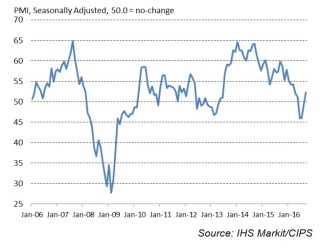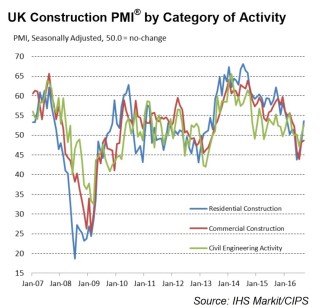September data highlighted an upturn in business activity across the UK construction sector for the first time since May, primarily driven by a recovery in residential building. New orders also rebounded during September, according to sample data gathered by ISH Markit, ending a four-month period of sustained decline.
Survey respondents cited improving confidence among clients and a reduced drag on demand from Brexit-related uncertainty. Reflecting this, construction firms indicated a further recovery in their business expectations for the next 12 months, with optimism the strongest since May.
Nearly half of the survey panel (45%) forecast a rise in output over the year ahead, while only 9% anticipate a reduction. However, the degree of confidence remained softer than that seen at the start of 2016.
Adjusted for seasonal influences, the Markit/CIPS UK Construction Purchasing Managers’ Index (PMI) registered a score of 52.3 in September, up from 49.2 in August and above the 50.0 no-change value for the first time in four months. The latest reading was well above July’s seven-year low and indicated the fastest rise in construction output since March. The pace of expansion was nonetheless still softer than the long-run survey average (54.6).
A solid rebound in residential activity was the key factor boosting overall construction output during September. Moreover, the latest increase in housing activity was the strongest recorded since January. A number of firms cited resilient demand for residential building work and generally improving market conditions. Construction companies pointed to a renewed rise in civil engineering activity, with the pace of expansion the fastest since March.
Commercial construction activity decreased for the fourth month running, which is the longest period of sustained decline since early-2013. However, the latest fall was only modest and the slowest recorded since the downturn began in June.
Higher levels of overall construction activity were supported by a rise in new work for the first time since April. Anecdotal evidence suggested that signs of improving domestic economic conditions, and an upturn in housing-related demand in particular, had contributed to greater volumes of incoming new work in September. This in turn led to a further moderate rise in employment levels across the construction sector, although sub-contractor usage continued to fall at one of the fastest rates since late-2013.
Mirroring the positive trends seen for business activity and new work, survey data highlighted a return to rising input buying across the construction sector. Meanwhile, construction companies indicated that supply chain pressures eased in September, with the latest deterioration in vendor performance the least marked seen for almost six years.
There were again widespread reports that exchange rate depreciation had pushed up the cost of construction materials during September. A number of survey respondents noted that domestic suppliers had sought to pass on higher imported raw material costs. Although easing since August, the rate of input price inflation was close to the highest for two years.

Tim Moore, senior economist at HIS Markit and author of the Markit/CIPS Construction PMI, said: “UK construction companies moved back into expansion mode during September, led by a swift recovery in residential building from the three-and-a-half year low recorded in June.
“Resilient housing market conditions and a renewed upturn in civil engineering activity helped to drive an overall improvement in construction output volumes for the first time since the EU referendum. A number of survey respondents noted that Brexit-related anxiety has receded among clients, although it remained a factor behind the ongoing decline in commercial building work.
“Construction firms appear reasonably optimistic about the near-term outlook, with confidence linked to the fastest rise in new orders since March and a more upbeat economic newsflow in general. However, the sector remains on a much weaker growth trajectory than seen at the start of 2016, which contrasts with the export-led surge in manufacturing production during September.
“Not only are UK construction companies feeling the impact of subdued investment spending relative to earlier this year, but the weak pound has contributed to a sharp acceleration in cost inflation. There were again widespread reports that domestic suppliers had acted quickly to pass on higher imported raw material costs, despite softer demand conditions in recent months.”
Will Waller, market intelligence lead at Arcadis, said: “The improved score is really good news but gives reason for cautious optimism however, with the mooted triggering of the formal EU exit process in the first quarter of 2017 likely to be a catalyst for further, potentially deeper, uncertainty in the market. This could still bring risks to construction demand growth depending on the actual or perceived progress in Britain's negotiations with the EU, which will be the critical influencer on future levels of sentiment and investment.”
Paul Trigg, construction specialist and assistant head of risk underwriting at insurance company Euler Hermes, said: “Payment issues in the construction sector were increasing even before the Brexit vote and going forward, this trend should continue. Weaker investment flows, higher input costs, skilled and migrant labour shortages and a cutback on bank lending will all have a part to play too.
“Construction is sitting in the eye of the storm. The sector has yet to feel the full brunt of Brexit as a healthy pipeline of work will carry companies through the next 12 to 18 months. Triggering Article 50 is likely to spark a significant change, and encouraging indicators could be false positives.
“The government has an opportunity in the autumn statement to strengthen the commitment to infrastructure spending. Projects like Hinckley Point, together with smaller scale developments to keep the economy moving, will be on the wish list of a sector that needs more prospects on its horizon.”
Got a story? Email news@theconstructionindex.co.uk





